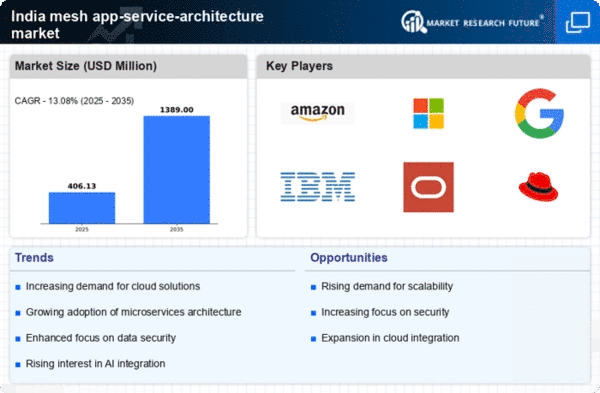Enhanced Focus on Security
Security concerns are paramount in the mesh app-service-architecture market, particularly in India, where cyber threats are on the rise. Organizations are increasingly adopting architectures that provide robust security features to protect sensitive data and maintain compliance with regulations. The market is witnessing a shift towards solutions that integrate security at every layer of the architecture. Recent statistics suggest that around 60% of Indian companies are investing in security enhancements as part of their digital transformation initiatives. This focus on security not only safeguards assets but also builds customer trust, which is essential for the growth of the mesh app-service-architecture market.
Rising Demand for Scalability
The mesh app-service-architecture market in India is experiencing a notable surge in demand for scalable solutions. As businesses expand, they require architectures that can seamlessly accommodate growth without compromising performance. This demand is driven by the increasing need for flexibility in deploying applications across various environments. According to recent data, approximately 70% of Indian enterprises are prioritizing scalability in their IT strategies. This trend indicates a shift towards architectures that can dynamically adjust resources based on real-time requirements, thereby enhancing operational efficiency. The mesh app-service-architecture market is positioned to benefit from this trend, as organizations seek to implement solutions that can support their evolving business models.
Growing Interest in Automation
Automation is becoming a critical driver in the mesh app-service-architecture market in India. Businesses are recognizing the potential of automated processes to enhance efficiency and reduce operational costs. The integration of automation tools within service meshes allows for streamlined management of microservices, leading to improved performance and reduced downtime. Data indicates that nearly 65% of Indian organizations are exploring automation solutions to optimize their IT operations. This growing interest in automation is likely to propel the mesh app-service-architecture market forward, as companies seek to leverage technology to achieve greater agility and responsiveness.
Shift Towards Hybrid Cloud Solutions
The transition to hybrid cloud environments is influencing the mesh app-service-architecture market in India. Organizations are increasingly adopting hybrid models to leverage the benefits of both on-premises and cloud resources. This shift is driven by the need for flexibility, cost-effectiveness, and improved performance. Data suggests that approximately 75% of Indian enterprises are considering hybrid cloud strategies as part of their IT roadmap. The mesh app-service-architecture market stands to gain from this trend, as these architectures are well-suited to facilitate seamless integration between diverse environments, thereby enhancing operational capabilities.
Increased Investment in IT Infrastructure
Investment in IT infrastructure is a significant driver for the mesh app-service-architecture market in India. As organizations strive to modernize their systems, there is a marked increase in funding directed towards upgrading existing infrastructure to support advanced architectures. Recent reports indicate that IT spending in India is projected to grow by 8% annually, with a substantial portion allocated to enhancing service delivery capabilities. This investment is crucial for enabling the adoption of mesh app-service-architecture solutions, which require robust underlying infrastructure to function effectively. Consequently, the market is likely to see accelerated growth as businesses prioritize infrastructure improvements.
















